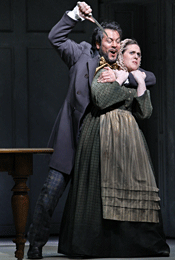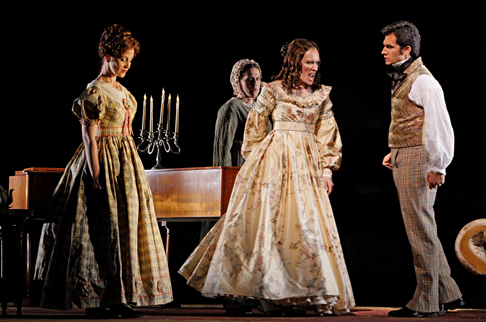22 Apr 2011
Minnesota Opera rescues Herrmann work
There’s more Byron than Brontë in Bernard Herrmann’s 1951 Wuthering Heights.

There’s more Byron than Brontë in Bernard Herrmann’s 1951 Wuthering Heights.
That’s the case at least in the Minnesota Opera’s mesmerizing production of the largely forgotten work that opened at St. Paul’s Ordway Center on April 16. Herrmann’s score, completed in neighboring Minneapolis in 1951, is Romanticism writ large and saturated with Weltschmerz. And it all hurts so good!
With the help of librettist — and first wife — Lucille Fletcher Herrmann took much of the agony — but none of the angst — out of Emily Brontë’s 1847 novel. It is now a gentler story; they have softened the narrative line and made these forlorn credible in their passions — and their frustrations. The frame of the 19th-century social novel is still there, but these are people who would have a hard time building meaningful relationships even without the barriers of caste. To make this clear, MO assembled a great production team for a staging that — one hopes — will be seen on other companies.
Only someone with a heart of stone could resist loving Heathcliff as played by Lee Poulis, a Hollywood-handsome baritone who must be spectacular Don Giovanni, a role he has played at Sarasota Opera. He’s moody, to be sure, but Simonson does not place great emphasis on Heathcliff’s origins as a Gypsy foundling taken into the stuffy and inhibited Earnshaw family. And his problems are explained only in part by the social structure of the day. Poulis shrouds him in darkness — that’s what makes him fascinating to women (and at some point in the past to the elder Earnshaw who brought him home from Liverpool).
 Ben Wager as Hindley Earnshaw and Victoria Vargas as Nelly Dean
Ben Wager as Hindley Earnshaw and Victoria Vargas as Nelly Dean
It’s clear that Heathcliff is an unlikely candidate for an enduring Mr. Right in any era. He’s a complex guy — even when “sanitized” and gussied up in fancy duds. (How he comes to wealth so suddenly is left a secret by Brontë.) Thus it’s unavoidable that Catherine Earnshaw will love Heathcliff even after her marriage to colorless Edgar Litton, and that there’s no way out of this dilemma for her.
As Catherine Sara Jakubiac replaced Kelly Kaduce, originally slated to sing the role. Although she might not yet have Kaduce’s polish, Jakubiac may have an even richer and larger voice than Kaduce, the MO favorite who returns to the company as Madama Butterfly next season. Jakubiac made the long solo scene in which Catherine faces the hopelessness of her situation both gripping and engaging.
Equally touching was mezzo Adriana Zabala in writing the confessional letter that leaves no doubt about the miseries of her life with Hindley Earnshaw, sung by bass Ben Wager. Wager, on the other hand, somewhat overplays his addiction to alcohol in a scene that breaks with the overall resolute calm of Herrmann’s score.
 Adriana Zabala as Isabella Linton, Victoria Vargas as Nelly Dean, Sara Jakubiak as Catherine Earnshaw and Eric Margiore as Edgar Linton
Adriana Zabala as Isabella Linton, Victoria Vargas as Nelly Dean, Sara Jakubiak as Catherine Earnshaw and Eric Margiore as Edgar Linton
It’s a pity that as Edgar, Eric Margiore, the only tenor in the cast, has so little to sing. His one aria was lovingly delivered.
Although the part is small, bass-baritone Rodolfo Nieto brought one of the strongest voices in the cast to farmhand — and religious fanatic — Joseph.
One wishes one might have heard more of Jesse Blumberg — one of America’s great young baritones and a MO regular — than was allotted him as Mr. Lockwood in the opening scene.
Herrmann — most famous for such film scores as Citizen Cane and Psycho —otherwise spent his life largely as a conductor. It is not surprising, then, that Wuthering Heights is in concept orchestral, and in Michael Christie MO chose a conductor who knew how to make the most of this fact. Punctuated by many solo moments, Wuthering Heights as drama is essentially through-composed, in light of which Christie kept a sensitive finger on the pulse of the score.
Despite a staging at Portland in 1981 and a concert performance in France last summer, Wuthering Heights has never found its way into the repertory, because — allegedly — Herrmann was offended by any suggestion that he shorten the 3.5 hour work. That the MO performance lasted less than three hours seems to indicate that significant cuts were made in this production. Despite the length of the performance Christie kept attention riveted on the opera.
The sets and costumes by Neil Patel and Jane Greenwood, respectively, were predictable, Wendall K. Harrington brought visual enchantment to the production with the projections of which she now seems the national master. (She was equally successful with her contribution to Ricky Ian Gordon’s Rappahannock County, premiered at the Virginia Arts Festival on April 12.)
This production is part of Minnesota’s New Works Initiative, designed to focus attention on new or neglected work. A “first” for the company, the staging will be filmed in high definitive for digital distribution. (Confession: I set out to read Brontë’s novel for the first time in 65 years, but put it aside half way through. Herrmann’s version of the story is far better entertainment.) Dates for broadcasts and showing have not been set at this time.
Wes Blomster